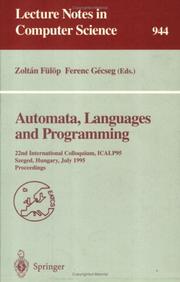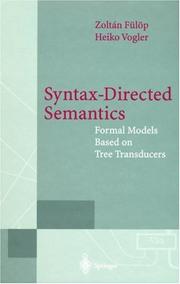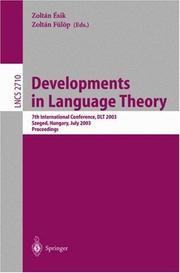| Listing 1 - 3 of 3 |
Sort by
|

ISBN: 3540600841 3540494251 9783540600848 Year: 1995 Volume: 944 Publisher: Berlin ; Heidelberg ; New York Springer
Abstract | Keywords | Export | Availability | Bookmark
 Loading...
Loading...Choose an application
- Reference Manager
- EndNote
- RefWorks (Direct export to RefWorks)
This volume constitutes the proceedings of the 22nd Interna- tional Colloquium on Automata, Languages, and Programming, held under the sponsorship of EATCS in Szeged, Hungary in July 1995. The volume presents four invited papers and 53 full revised research papers selected from a total of 111 submissions. ICALP traditionally covers the whole area of theoretical computer science; among the topics addressed in the volume are concurrency, automata, formal languages, algorithms, communication protocols, computational complexity, computability, foundations of programming, learning and coding, and semantics.
Machine theory --- Formal languages --- Programming (Electronic computers) x Congresses. --- Automates mathématiques, Théorie des --- Langages formels --- Congresses. --- Congrès --- Automates mathématiques, Théorie des --- Congrès --- Congresses --- Programming (Electronic computers) --- Computer science. --- Information theory. --- Data structures (Computer scienc. --- Data encryption (Computer science). --- Robotics and Automation. --- Programming Languages, Compilers, Interpreters. --- Theory of Computation. --- Programming Techniques. --- Data Structures. --- Cryptology. --- Data encoding (Computer science) --- Encryption of data (Computer science) --- Computer security --- Cryptography --- Communication theory --- Communication --- Cybernetics --- Informatics --- Science

Abstract | Keywords | Export | Availability | Bookmark
 Loading...
Loading...Choose an application
- Reference Manager
- EndNote
- RefWorks (Direct export to RefWorks)
Programming languages (Electronic computers) --- Transducers. --- Semantics.

ISBN: 3540404341 3540450076 Year: 2003 Publisher: Berlin, Heidelberg : Springer Berlin Heidelberg : Imprint: Springer,
Abstract | Keywords | Export | Availability | Bookmark
 Loading...
Loading...Choose an application
- Reference Manager
- EndNote
- RefWorks (Direct export to RefWorks)
This book constitutes the refereed proceedings of the 7th International Conference on Developments in Language Theory, DLT 2003, held in Szeged, Hungary, in July 2003. The 27 revised full papers presented together with 7 invited papers were carefully reviewed and selected from 57 submissions. All current aspects in language theory are addressed, in particular grammars, acceptors, and transducers for strings, trees, graphs, arrays, etc; algebraic theories for automata and languages; combinatorial properties of words and languages; formal power series; decision problems; efficient algorithms for automata and languages; and relations to complexity theory and logic, picture description and analysis, DNA computing, quantum computing, cryptography, and concurrency.
Formal languages --- Algebra --- Mathematics --- Physical Sciences & Mathematics --- Computer science. --- Science. --- Computers. --- Computer logic. --- Mathematical logic. --- Computer science --- Computer Science. --- Mathematical Logic and Formal Languages. --- Science, general. --- Computation by Abstract Devices. --- Logics and Meanings of Programs. --- Discrete Mathematics in Computer Science. --- Mathematics. --- Computer mathematics --- Discrete mathematics --- Electronic data processing --- Algebra of logic --- Logic, Universal --- Mathematical logic --- Symbolic and mathematical logic --- Symbolic logic --- Algebra, Abstract --- Metamathematics --- Set theory --- Syllogism --- Computer science logic --- Logic, Symbolic and mathematical --- Automatic computers --- Automatic data processors --- Computer hardware --- Computing machines (Computers) --- Electronic brains --- Electronic calculating-machines --- Electronic computers --- Hardware, Computer --- Computer systems --- Cybernetics --- Machine theory --- Calculators --- Cyberspace --- Natural science --- Science of science --- Sciences --- Informatics --- Science --- Logic design. --- Computational complexity. --- Science, Humanities and Social Sciences, multidisciplinary. --- Complexity, Computational --- Design, Logic --- Design of logic systems --- Digital electronics --- Electronic circuit design --- Logic circuits --- Switching theory --- Computer science—Mathematics.
| Listing 1 - 3 of 3 |
Sort by
|

 Search
Search Feedback
Feedback About UniCat
About UniCat  Help
Help News
News